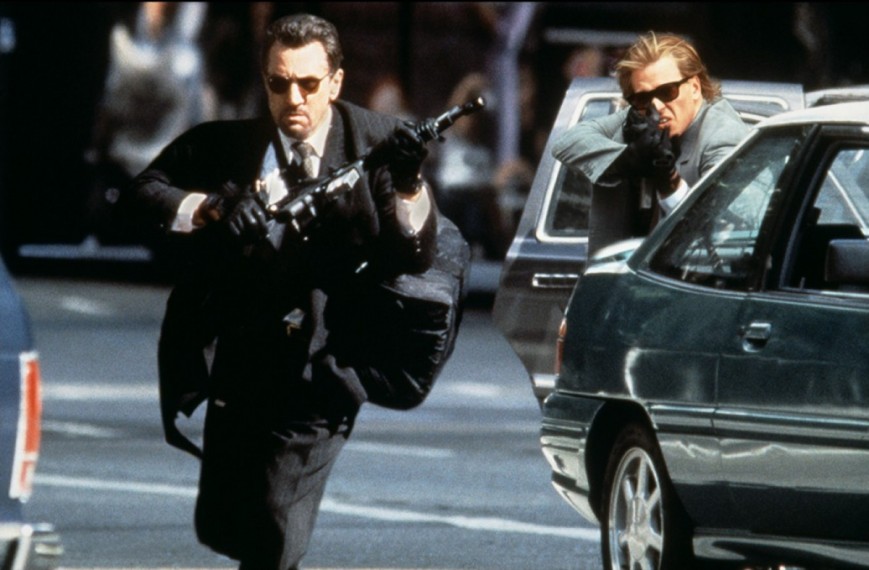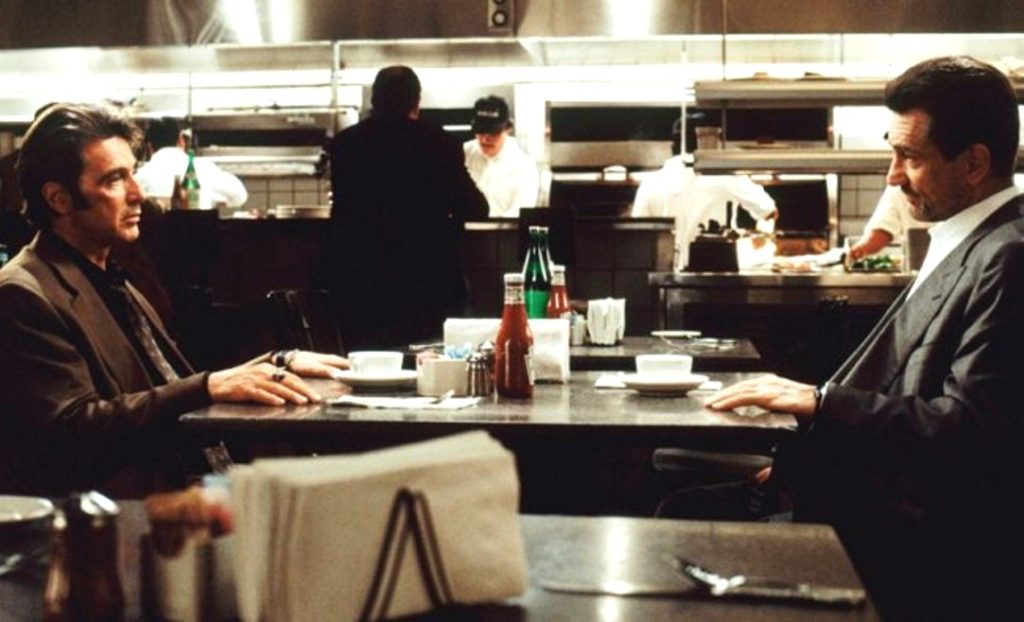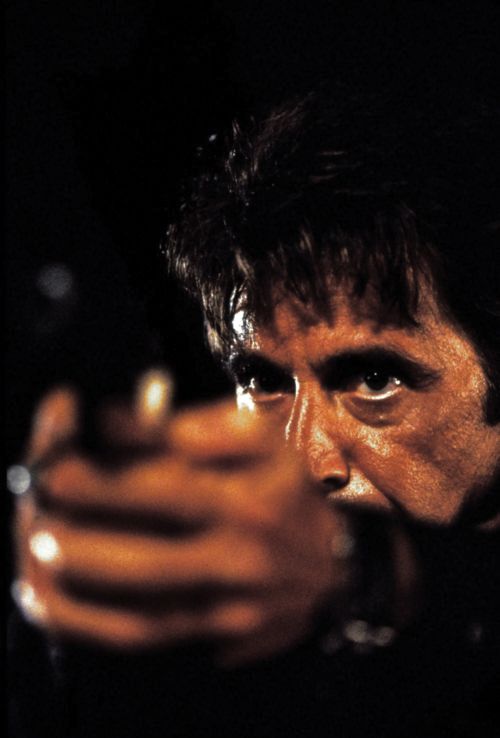Heat (1995)
CAST: Al Pacino, Robert De Niro, Val Kilmer, Tom Sizemore, Diane Venora, Ashley Judd, Amy Brenneman, Jon Voight, Mykelti Williamson, Dennis Haysbert, Wes Studi, Ted Levine, William Fichtner, Danny Trejo, Kevin Gage, Natalie Portman
REVIEW:
Heat is writer-director Michael Mann’s (Manhunter, The Last of the Mohicans) magnum opus ode to the crime thriller genre, what could have been a generic tale of cops and robbers elevated to crime epic by a level of depth and nuance one doesn’t often find in the genre, assured direction, and a smart screenplay that has something to say beyond hard-boiled crimebusters cliches. This is just as masterful filmmaking as Mann’s 1992 adventure The Last of the Mohicans, and in a completely different genre and setting.
While Heat juggles a sprawling ensemble cast of characters, at the core of the story are two men on opposite sides but perhaps not so completely different. One is Vincent Hanna (Al Pacino at his very most Pacino-esque), a hard-driving, dogged veteran LA detective on the verge of burning out, poorly balancing a troubled homelife including a neglected wife (Diane Venora) and troubled stepdaughter (Natalie Portman) with hunting down criminals like a bloodhound. The other is veteran career criminal Neal McCauley (Robert De Niro at his very most De Niro-esque), mastermind of a small, tight crew of thieves (Val Kilmer, Tom Sizemore, Danny Trejo), who lives by a code once taught him by a prison mentor: “don’t get attached to anything you are not prepared to walk away from in thirty seconds flat if you feel the heat around the corner”….a code he finds himself faltering in his commitment to when he meets Eady (Amy Brenneman), a lonely graphics designer who doesn’t know who she’s falling into bed with. Hanna and McCauley first cross paths (indirectly) when Hanna arrives at the aftermath of a broad daylight knockover of an armored car that leaves the guards dead and a stack of bearer bonds missing. From there commences a cat-and-mouse game, with McCauley managing to stay one step ahead of the LAPD at every turn, even as he risks it all on one last brazen bank heist meant to secure his future in New Zealand. There are other subplots that feed into the main storyline. McCauley’s crew takes a shot on a newbie, Waingro (Kevin Gage), but when the trigger-happy Waingro instigates a bloodbath, and subsequently escapes McCauley’s vengeance, the slippery criminal continues to be a thorn in McCauley’s side, especially when he gets in cahoots with shady businessman Van Zant (William Fichtner), who also becomes a target of McCauley’s wrath when he puts out a failed hit on the thief for stealing his bearer bonds. But ultimately, the core clash will come down to Hanna versus McCauley, when the crew’s bank heist erupts into all-out warfare in the street.
In lesser hands, Heat, which was loosely based on real-life Chicago detective Chuck Adamson’s 1960s conflict with thief Neal McCauley and had previously been brought to the screen by Mann himself in the 1989 TV movie LA Takedown, could have been a generic cops versus robbers cat-and-mouse shoot-em-up. Instead, Mann’s writing and direction elevates the material to lofty aims with dialogue that is sometimes downright poetic and has something to say. The characters express themselves with more depth, about more subject matter than just hard-boiled cliches and one-liners. Heat opens with a bang, with a well-orchestrated armored car robbery, and the cat-and-mouse games ensue from then until the closing scene, but the principals still find time to come off as well-developed. Significant effort is taken to show the self-described “disaster zone” of Hanna’s crumbling family life, with Diane Venora delivering a monologue summing up his nature (“You don’t live with me. You live among the remains of dead people. The rest is just the mess you leave behind as you pass through.”). “If you’re on me and you gotta move when I move, how do you expect to maintain a marriage?” his own nemesis McCauley points out to him with clear-eyed logic, but despite his own ruthless pragmatism, McCauley himself commits a cardinal sin of forming an attachment that could prove to be his Achilles’ Heel. “I am alone. I am not lonely”, he insists, unconvincingly. The movie floats the theme that, under the surface, Hanna and McCauley may also be a strange sort of kindred spirits. Both weary, middle-aged career professionals driven by single-minded purpose, they are firmly on opposite sides, but may understand one another better than anyone else. The scene in which they share coffee and civil conversation, is, behind the heists and shootouts and cat-and-mouse games, the true central moment of the movie. It was also a momentous cinematic occasion, the first time oft-compared icons Pacino and De Niro had ever shared a movie scene, and one of the very few times here where they come directly face-to-face (they had previously both appeared, though never together, in 1974’s The Godfather Part II). McCauley and Hanna don’t face off with tough guy banter or swap macho one-liners, as these sorts might in a dumber movie. They confide about their personal lives and troubled dreams (McCauley has one about drowning, Hanna about being faced with every murder victim he’s ever seen), and while it’s clear they mutually respect each other, each reaffirms that he will gun the other down if necessary.
When it comes to “good versus evil”, Heat takes a nuanced perspective. Perhaps apart from Waingro, the most obvious “villain” to be found (who has limited screentime and is a fairly minor supporting part), nobody among either the cops or robbers wears either horns or halos. Intentional parallels are drawn between the two “crews” (we switch between both McCauley’s crew and Hanna’s cops enjoying dinner get-togethers with wives and children in tow), and there are times when, depending on one’s perspective, Hanna could be seen as either the protagonist or antagonist. The movie doesn’t water down or beat around the bush about how ruthless McCauley’s crew can be when they deem it necessary; though they prefer to avoid bloodshed, they do not shy away from violence, and McCauley is both directly and indirectly responsible for the deaths of multiple both guilty and innocent people, yet many viewers will admit to at least grudgingly having a sliver of hope for him to somehow get away in the end, even if objectively we shouldn’t really be rooting for him. Heat doesn’t ask us to condemn or condone anyone, simply portrays them, as dimensional human beings in shades of gray, some lighter or darker than others but very few entirely black or white.
Al Pacino and Robert De Niro were reportedly both Mann’s first choices for Hanna and McCauley, and their castings are a case of two veteran actors with well-established onscreen personas using them to their best advantage and embodying their roles perfectly. Neither is playing against type or doing anything outside of their comfort zone; rather, they’re embodying archetypes they’ve played before, Pacino as the strung-out cop on the verge of burning out, De Niro the tight-lipped, hard-nosed criminal, but this is a case where the typecasting works and they fit their roles like gloves. They’re a study in contrasts, Pacino scurrying around like a ferocious Chihuahua, gnashing on scenery with his trademark gusto, De Niro taciturn and stoic and collected, but despite only sharing two scenes in which they come directly face-to-face, we buy their rivalry and “brothers under the surface” sort of bond.
The supporting characters don’t get as much focus, but there are some touches. Val Kilmer’s Shiherlis is cool and efficient on the job but a gambling addict in his free time who spends money as fast as he makes it, leaving his wife (Ashley Judd) frustrated and on the verge of bailing. This and a few other subplots, including McCauley’s enmity with both Waingro and Van Zant, and a recently paroled ex-con finding lawful employment (Dennis Haysbert), all come to feed into the “main” narrative. The large cast uniformly acquits itself effectively with what it’s given, with Kilmer, Tom Sizemore, and Danny Trejo on McCauley’s crew and Hanna’s cops including Wes Studi (The Last of the Mohicans’ Magua), Ted Levine, and Mykelti Williamson. Ashley Judd and Natalie Portman don’t get much to do, although they pretty much make the most out of their meager roles. Smaller supporting roles include Dennis Haysbert, Hank Azaria, William Fichtner as the weaselly Van Zant, Kevin Gage as the slimy Waingro, and Jon Voight as McCauley’s fence, and there are bit parts for Jeremy Piven, Tom Noonan (Francis Dolarhyde in Mann’s Manhunter), Xander Berkeley (who played Waingro in LA Takedown), Henry Rollins, Tone Loc, and Martin Ferrero (Jurassic Park‘s Gennaro).
 Heat can get talky at times (characters prone to expressing themselves via quasi-poetic monologues), but it doesn’t skimp on action. The action, whether the methodically-devised opening heist or the midsection bank robbery that spills out into perhaps the most fast and furious street shootout ever committed to film (featuring McCauley’s crew blasting with machine guns at squads of cops), or smaller-scale moments (such as when McCauley survives an assassination attempt) have a visceral kick. The street shootout in particular (which along with the coffee scene is the part everyone is likely to remember) is a thunderously intense and kinetically thrilling sequence. The lower-key cat-and-mouse games are also intriguing, such as a suspenseful moment where Hanna’s surveillance team spying on McCauley’s crew during a robbery inadvertently alerts them to their presence, and a scene where McCauley (knowing by now that he is under constant surveillance) takes his crew to a wide open, isolated warehouse area, where he stands and points around and outlines some plan. Afterward, the cops walk around the same area in confusion, trying to figure out what the crew was plotting (there are no apparent targets in sight). Finally, Hanna has his lightbulb moment: “You know what they’re looking at? Us.” Sure enough, McCauley is perched on a roof photographing Hanna through a lens, now putting a face to his pursuer.
Heat can get talky at times (characters prone to expressing themselves via quasi-poetic monologues), but it doesn’t skimp on action. The action, whether the methodically-devised opening heist or the midsection bank robbery that spills out into perhaps the most fast and furious street shootout ever committed to film (featuring McCauley’s crew blasting with machine guns at squads of cops), or smaller-scale moments (such as when McCauley survives an assassination attempt) have a visceral kick. The street shootout in particular (which along with the coffee scene is the part everyone is likely to remember) is a thunderously intense and kinetically thrilling sequence. The lower-key cat-and-mouse games are also intriguing, such as a suspenseful moment where Hanna’s surveillance team spying on McCauley’s crew during a robbery inadvertently alerts them to their presence, and a scene where McCauley (knowing by now that he is under constant surveillance) takes his crew to a wide open, isolated warehouse area, where he stands and points around and outlines some plan. Afterward, the cops walk around the same area in confusion, trying to figure out what the crew was plotting (there are no apparent targets in sight). Finally, Hanna has his lightbulb moment: “You know what they’re looking at? Us.” Sure enough, McCauley is perched on a roof photographing Hanna through a lens, now putting a face to his pursuer.
Heat is such masterful filmmaking that its minor flaws fall by the wayside, but there are some. Apart from Hanna and McCauley, no one is fully-developed, and no one in the supporting cast gets much attention on their personal lives apart, to a point, from Shiherlis. Subplots occasionally feel a little underdeveloped and/or superfluous (although they all affect the plot in some way). The movie’s three hour runtime is a formidable investment of time and attention, and it peaks with the colossal street battle that one might expect to be the climax, but then has over an hour more to go wrapping up the various plot strands in the aftermath. There are moments when the dialogue verges into pretentious and heavy-handed (such as when Hanna’s wife segues into an overly scripted monologue describing his character, like she’s just been waiting for her big moment the whole movie). But for the great majority of its sizable runtime, Heat is compelling and sure-footed enough that the three hours glide smoothly by until the last shot is fired and the end credits roll. “Crime epic” is a term sometimes tossed around too easily, but with Heat it’s earned.
* * * 1/2

